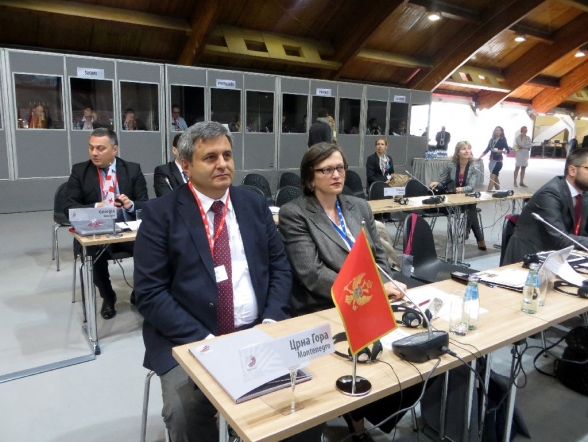Today in Riga, within the Latvian presidency of the European Union, the LIII Conference of Community and European Affairs Committees of Parliaments of the European Union (COSAC) Plenary Meeting has begun. The Conference was moderated by Ms Lolita Čigāne, Chairperson of the European Affairs Committee of the Saeima of the Republic of Latvia, while the Parliament of Montenegro was represented by Chairperson of the Committee on European Integration Mr Slaven Radunović and Committee member Ms Nada Drobnjak.
The Meeting was opened by Ms Ināra Mūrniece, Speaker of the Saeima of the Republic of Latvia, who pointed out that the parliamentary debate was one of the key mechanisms for finding solutions for challenges that the Union was facing such as the state of economy, energy independence, and security issues in the European neighbourhood. In the introductory part, the parliamentarians were addressed by Ms Laimdota Straujuma, Prime Minister of the Republic of Latvia, who presented three main priorities of the Latvian Presidency: Competitive Europe, Digital Europe and Engaged Europe. With a view to creating a competitive Union, she highlighted the work on establishing the European Union Fund for Strategic Investments, which would facilitate implementation of important project, and help to attract investments in the area of information technology, telecommunication, and energy. In addition, she highlights the significance of establishing the Energy Union, as a key response not only to geopolitical developments in the world, but also to the need for strengthening the energy independence. By achieving the goal of Digital Europe, said Ms Straujuma, Latvia would like to contribute to creating a stronger and more coherent system of data protection, establishing a reliable digital market, and reducing the roaming prices within the EU. Engaged Europe, as the third priority, refers to the neighbourhood policy, strengthening of relations with the East Partnership countries, and promotion of transatlantic relations, pointed out Ms Straujuma, and added that, in line with the recent events in Europe, Latvia reacted by including the challenges such as terrorism, radicalism, illegal immigration, and cyber-crime in the priorities of the Presidency.
The Meeting was continued with a session within which procedural matters were considered, and the 23rd Bi-Annual Report of COSAC was presented. That was followed by a debate on the topic of the EU energy policy, where the speakers were: Mr Maroš Šefčovič, Vice-President of the European Commission for Energy Union; Mr Jerzy Buzek, Chair of the Committee on Industry, Research and Energy of the European Parliament, as well as Mr Petr Hlobil, Chair of the Green 10. It was outlined at the session that a strong investment framework, foreseeable legislation, and European leadership were necessary for establishment of the Energy Union. In that respect, it was estimated that the EU still had not established a healthy investment climate, which directly affected the energy and transport. The speakers also recalled the need for energy diversification and strengthening of cooperation with the neighbouring countries through the Energy Community, but also the need for promotion of energy efficiency, awaiting the UN Climate Change Conference (COP21) which will be held in Paris, in December.
On the topic of the EU Trade Policy, Ms Cecilia Malmström, European Commissioner for Trade, and Mr Artis Pabriks, member of the International Trade Committee of the European Parliament, spoke in the session. During the session, they pointed out the significance of promoting cooperation with the USA and Canada, through signing of the Transatlantic Trade and Investment Partnership (TTIP) and Canada-EU Comprehensive Economic and Trade Agreement (CETA), aimed at abolishing tariffs and establishing free trade. The speakers emphasised that these agreements would contribute to growth of export and employment, but also to the activities of small and medium-sized enterprises. The session was also the opportunity to share opinions on the content of those agreements, and resolving concerns regarding the implications of their implementation.
The Meeting will end tomorrow, with a debate on the future of the parliamentary scrutiny of the European Union affairs, launching of the so-called “green card” aimed at enhancing the political dialogue, as well as the European Commission’s Multiannual Work Programme and the role of national parliaments.









